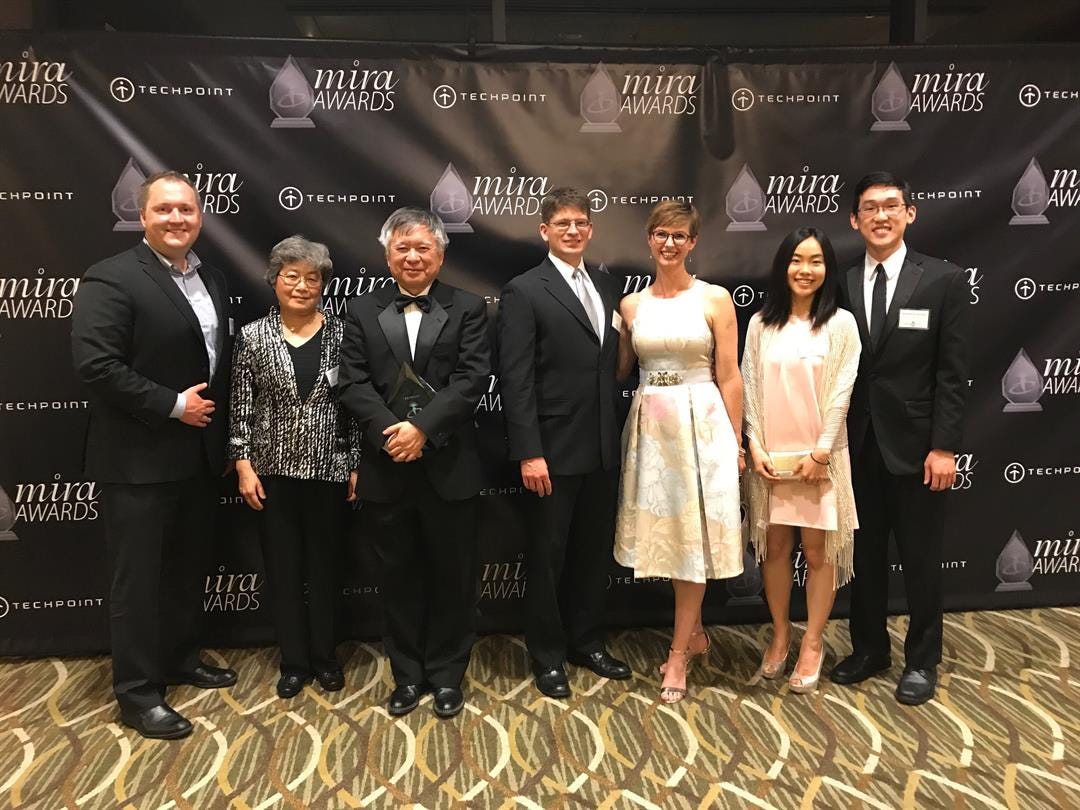Heart-Monitoring Device Scores Tech Award
 The Arrhythmotech team won Innovation of the Year at TechPoint's Mira Awards.
The Arrhythmotech team won Innovation of the Year at TechPoint's Mira Awards.
Subscriber Benefit
As a subscriber you can listen to articles at work, in the car, or while you work out. Subscribe NowA technology that could alert doctors that a patient is at risk of sudden cardiac death took a top prize at the recent 18th Annual Mira Awards, presented by Indiana’s tech initiative TechPoint. Arrhythmotech’s device detects which cardiology patients are in such life-threatening situations by simply attaching sensors to the skin. Awarded Innovation of the Year in the product category at the Mira Awards, Arrhythmotech says detecting cardiac emergencies is likely just the beginning.
Based in Indianapolis at the Indiana Center for Biomedical Innovation, Arrhythmotech says its neuECG device records and processes sympathetic nerve activity and electrocardiogram signals. A conventional ECG (or EKG) focuses only on the latter measurement, but Arrhythmotech’s device adds sympathetic nerve activity to the picture.
Sympathetic nerve activity operates fundamental involuntary processes in the body, including a person’s breathing, heartbeat and digestive system. The startup will initially focus on cardiology applications; the device aims to detect patients with arrhythmia—an irregular heartbeat—and also flag patients at risk of sudden cardiac death.
Arrhythmotech Chief Executive Officer Joe Trebley says the current standard method for measuring sympathetic nerve activity is an invasive procedure that attaches electrodes directly to a nerve; Arrhythmotech’s device can capture the same information on a patient’s skin.
The technology is based on research conducted by Indiana University School of Medicine (IUSM) Medtronic Zipes Chair in Cardiology Dr. Peng-Sheng Chen. Because the technology directly measures part of the body’s stress response, the startup believes its applications reach far beyond cardiology.
Arrhythmotech is working to miniaturize the device into a wearable technology, much like a Fitbit-type product. Trebley says potential applications include predicting seizures for patients with epilepsy, monitoring performance for athletes and helping people with sleep apnea.
“With seizures, even if you’re only right half the time, it’s good to give the patient a signal that, if you’re driving a car, you may need to pull over,” says Trebley. “Once we get this into something that’s wearable—miniaturized—I think the power is going to be demonstrated, and that’s going to be a real takeoff point for us. You can imagine patches that can tell you your stress level—something like that will be very exciting to develop over the next couple years.”
Arrhythmotech worked with Rose-Hulman Ventures to develop a beta version of the neuECG, which is being tested at IUSM and other institutions throughout the country. Trebley says the device currently consists of ECG cuffs, three leads that attach to the chest or wrist and a box slightly larger than an iPhone, “but there’s nothing insurmountable about miniaturizing it all into something that’s wearable.”
Arrhythmotech has earned two small business grants from the National Institutes of Health totaling more than $1.5 million. While the device is gaining traction in the medical space, Trebley says the Mira award validates neuECG in the tech space.
“We’re just a bunch of physicians and biomedical engineers not terribly connected within the tech community,” says Trebley. “I think a lot of what we’ll be able to unpack has to do with not just the hardware—because it’s not terribly complicated hardware—but in the software and data analytics. We’re bringing some important data to play here, and it could be really impactful. Hopefully, we’ll get some attention from [experts] in data analytics and software development and plug into those business models.”
Arrhythmotech is focusing now on “driving acceptance of [neuECG’s] technique” and conducting studies to demonstrate its predictive power.
“We’re getting interest from groups in the wearable space, or in epilepsy, or in pain, who are beginning to say, ‘This could be really interesting to plug into what we’re doing,’” says Trebley. “We’re focused on the cardiology space currently, but I think what’s really fun about this technology is, its killer application is likely to be something we haven’t even thought of yet.”
Trebley says certain applications for the neuECG will require FDA approval.
Trebley says several organizations within Indiana have played a critical role in Arrhythmotech’s development.
